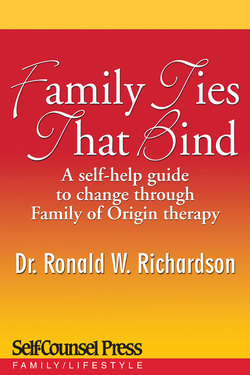Читать книгу Family Ties That Bind - Dr Ronald W. Richardson - Страница 12
На сайте Литреса книга снята с продажи.
1. I Say Tomato, You Say Tomahto — Anxiety About Differences
ОглавлениеMost people get married thinking their spouse is like them and they both want the same things in life. It doesn’t take long to discover this is not the case. Most of us are lucky if we make it through the honeymoon without a major clash over differences: what time to get up in the morning, where to eat dinner, how to squeeze the toothpaste tube. This is just the beginning of potentially serious conflicts in the relationship. Both partners begin to wonder if they made the right choice; maybe they made a mistake and married Dr. Jekyll. Certainly this person isn’t what he or she first appeared to be. It looks as if the two of them are not going to have the blissful togetherness they expected.
No two people can have an intense, intimate relationship without discovering significant differences between them. This is normal. It’s how we deal with those differences that creates problems. Most of us see these differences as a threat to our ideal of a good relationship: continual harmony between two people who want the same things at the same time.
When differences emerge, most of us try to make our partners more like us. After all, what is an intimate relationship for but to have a like-minded companion walking side by side with us down the road of life? When we find out that it’s not going to be like that, we become anxious. The normal pattern then is to think the cause of our anxiety is the behavior of the other person. Jose says to himself, “The reason I am unhappy is because of her. If she were different and acting the way I want her to, then I wouldn’t feel bad. It’s her fault.”
“Why can’t a woman be more like a man,” Professor Higgins cried. And we echo him: “Why can’t you be more like me?” Of course, we are usually too sophisticated to admit this is what we want, so we hide our intentions behind our thoughts. We think our spouses, children, bosses, or whoever “ought” to be a certain way. Often we say, “You should” or “You ought to,” but what we really mean is “I want you to.” For example, when Betta says to Stefan, “You should talk to me more,” she is disguising her anxiety about their differences. What is really at stake is that she likes conversation and Stefan doesn’t. If she were not anxious about the difference, Betta could say, “I would like you to talk with me.” That would be an honest expression of what she wants. Or Stefan might say to Betta, “I’d like some time to be quiet,” rather than, “You talk too much.”
These dynamics are not restricted to marriage of course. They are present in every relationship where there are differences (which is just about every relationship) and at least one of the people grows anxious about the differences. Parents and children, friends, coworkers, ethnic groups (where differences can be more visible), labor/management, liberals/conservatives, and nations all have to live with differences.
QUESTIONS
1. What were some of the major differences in your family of origin? How did people in the family handle these differences? Did some people handle particular differences better than others?
2. What are some of the major differences between you and your partner? How do you handle differences? In what ways are you trying to get your partner to change? In what ways is your partner trying to get you to change? How do you react?
